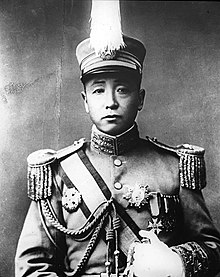This article needs additional citations for verification. (April 2024) |
Zhang Zuolin | |
|---|---|
張作霖 | |
 Zhang in military regalia | |
| Generalissimo of the Military Government of China | |
| In office 18 June 1927 – 4 June 1928 | |
| Premier | Pan Fu |
| Preceded by | Wellington Koo (as acting president) |
| Succeeded by | Tan Yankai (as chairman of the national government) |
| Warlord of Manchuria | |
| In office 1922 – June 4, 1928 | |
| Succeeded by | Zhang Xueliang |
| Personal details | |
| Born | March 19, 1875 Haicheng, Fengtian, Qing Empire |
| Died | June 4, 1928 (aged 53) Shenyang, Fengtian, Republic of China |
| Manner of death | Assassination |
| Nationality | Chinese |
| Political party | Fengtian clique |
| Spouses |
|
| Children | 14, including: |
| Awards | Order of Rank and Merit Order of the Golden Grain Order of Wen-Hu |
| Nickname(s) | Old Marshal Rain Marshal Mukden Tiger King of the Northeast |
| Military service | |
| Allegiance | |
| Years of service | 1900–1928 |
| Rank | Grand Marshal of the Republic of China, generalissimo |
| Battles/wars | |
Zhang Zuolin[a] (March 19, 1875 – June 4, 1928) was a Chinese warlord who ruled Manchuria from 1916 to 1928. He led the Fengtian clique, one of the most important factions during China's Warlord Era. During the last year of his life, he briefly installed himself as Generalissimo of the Republic of China.
Born to a poor peasant's family in Manchuria, Zhang became a prominent bandit in the region in the 1890s. After the Boxer Rebellion, his troops became a regiment of the Qing dynasty's army, and during the Russo-Japanese War, they were hired by the Japanese Army as mercenaries. During the 1911 Revolution, Zhang initially fought against the revolutionaries, and after the foundation of the Republic of China supported the Beiyang government. Zhang founded the Fengtian clique and gradually expanded his Northeastern Army, which established his supremacy over the three northeastern provinces (Fengtian, Jilin and Heilongjiang).
Zhang's government in Manchuria initiated important reforms and investments in agriculture and industry, resulting in good development. He was supported by the Japanese, who viewed him as best representing their economic interests. Seeking to extend his power to northern China, Zhang fought wars against the Anhui and Zhili cliques, after which he became the most powerful figure in the Beiyang government and proclaimed himself Generalissimo in 1927. Zhang's troops were defeated by the Kuomintang's Northern Expedition in 1928. During his retreat, he was assassinated by officers of the Japanese Kwantung Army. He was succeeded in Manchuria by his son, Zhang Xueliang, who recognized the Nationalist government.
Cite error: There are <ref group=lower-alpha> tags or {{efn}} templates on this page, but the references will not show without a {{reflist|group=lower-alpha}} template or {{notelist}} template (see the help page).